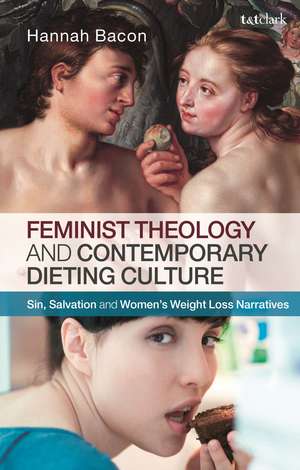Feminist Theology and Contemporary Dieting Culture: Sin, Salvation and Women’s Weight Loss Narratives
Autor Hannah Baconen Limba Engleză Paperback – 7 aug 2019
| Toate formatele și edițiile | Preț | Express |
|---|---|---|
| Paperback (1) | 233.91 lei 3-5 săpt. | |
| Bloomsbury Publishing – 7 aug 2019 | 233.91 lei 3-5 săpt. | |
| Hardback (1) | 716.00 lei 6-8 săpt. | |
| Bloomsbury Publishing – 7 aug 2019 | 716.00 lei 6-8 săpt. |
Preț: 233.91 lei
Preț vechi: 267.44 lei
-13% Nou
Puncte Express: 351
Preț estimativ în valută:
44.76€ • 46.95$ • 37.26£
44.76€ • 46.95$ • 37.26£
Carte disponibilă
Livrare economică 11-25 martie
Preluare comenzi: 021 569.72.76
Specificații
ISBN-13: 9780567659972
ISBN-10: 0567659976
Pagini: 360
Dimensiuni: 138 x 216 x 26 mm
Greutate: 0.5 kg
Editura: Bloomsbury Publishing
Colecția T&T Clark
Locul publicării:London, United Kingdom
ISBN-10: 0567659976
Pagini: 360
Dimensiuni: 138 x 216 x 26 mm
Greutate: 0.5 kg
Editura: Bloomsbury Publishing
Colecția T&T Clark
Locul publicării:London, United Kingdom
Caracteristici
Rooted in the real, lived experience of women who diet, this work engages qualitative research with feminist theological reflection
Notă biografică
Hannah Bacon is Acting Head of Theology and Religious Studies and Associate Professor in Feminist and Contextual Theology at the University of Chester, UK.
Cuprins
AcknowledgmentsIntroduction: Theology, Food and Fat: a Healthy Recipe? Chapter One: Syn, Danger, and Disordered Desire Chapter Two: Syn, Self-surveillance and Taking Care: Tensions and Ambiguities Chapter Three: Salvation, 'Getting Rid' and 'Getting There' Chapter Four: Rethinking Sin: Sizeism, the Victimization of Food and the Divided SelfChapter Five: Rethinking Salvation: a (Re)turn to 'Sensible' Eating Chapter Six: Rethinking Salvation: Sabbath and Fat Pride Conclusion: For the Love of Food, for the Love of Fat Bibliography Index
Recenzii
I commend this emancipatory, countercultural Christian anthropology that celebrates human bodies, especially women's bodies, as imago Dei without perfecting efforts.
By working within a feminist paradigm, Feminist Theology and Contemporary Dieting Culture rightfully orients the reader toward the oppressive (often double) standards that are applied to women, standards that lead to a disproportionate number of women who feel shame about their body.
In this age of understanding the human body and health mostly through the lens of science, it is easy to forget the long history of religious faith and its influence on contemporary western ideas and practices related to embodiment. In developing a feminist theological philosophy of weight loss, Hannah Bacon does a wonderful job of demonstrating the continuing importance of Christian beliefs in often surprising, but always thought-provoking ways.
Hannah Bacon offers a critical engagement with the pressing issue of women and dieting, which she rightly identifies as a political issue about the control and bounding of women's bodies. What emerges is an incarnational theology that claims women's bodies as bearers of the divine, as sacred. Sheencourages women to enjoy their flesh, offering the Sabbath as a symbol of how women may rest from a battle with their size and the Eucharist as a 'foody' celebration that encourages sensible eating, that is sensuous, communal eating that builds community. This book contributes new insights to the already scarce existing work on the subject - it offers a broader understanding of how slimming groups work and from this a sharp theological analysis which in turn brings to light new ways to understand theology.
By working within a feminist paradigm, Feminist Theology and Contemporary Dieting Culture rightfully orients the reader toward the oppressive (often double) standards that are applied to women, standards that lead to a disproportionate number of women who feel shame about their body.
In this age of understanding the human body and health mostly through the lens of science, it is easy to forget the long history of religious faith and its influence on contemporary western ideas and practices related to embodiment. In developing a feminist theological philosophy of weight loss, Hannah Bacon does a wonderful job of demonstrating the continuing importance of Christian beliefs in often surprising, but always thought-provoking ways.
Hannah Bacon offers a critical engagement with the pressing issue of women and dieting, which she rightly identifies as a political issue about the control and bounding of women's bodies. What emerges is an incarnational theology that claims women's bodies as bearers of the divine, as sacred. Sheencourages women to enjoy their flesh, offering the Sabbath as a symbol of how women may rest from a battle with their size and the Eucharist as a 'foody' celebration that encourages sensible eating, that is sensuous, communal eating that builds community. This book contributes new insights to the already scarce existing work on the subject - it offers a broader understanding of how slimming groups work and from this a sharp theological analysis which in turn brings to light new ways to understand theology.
